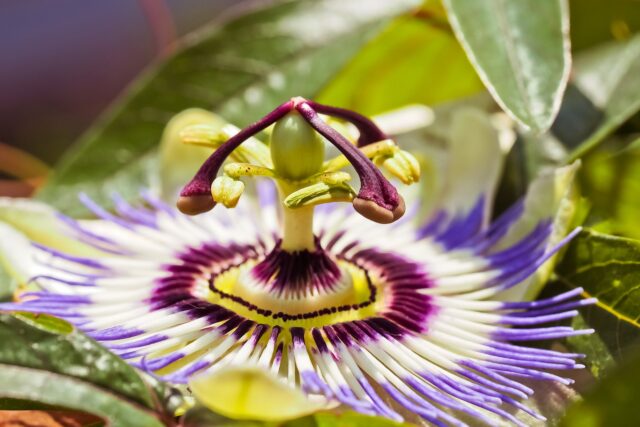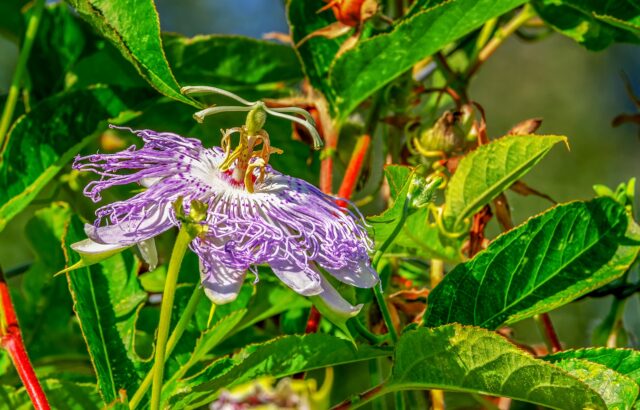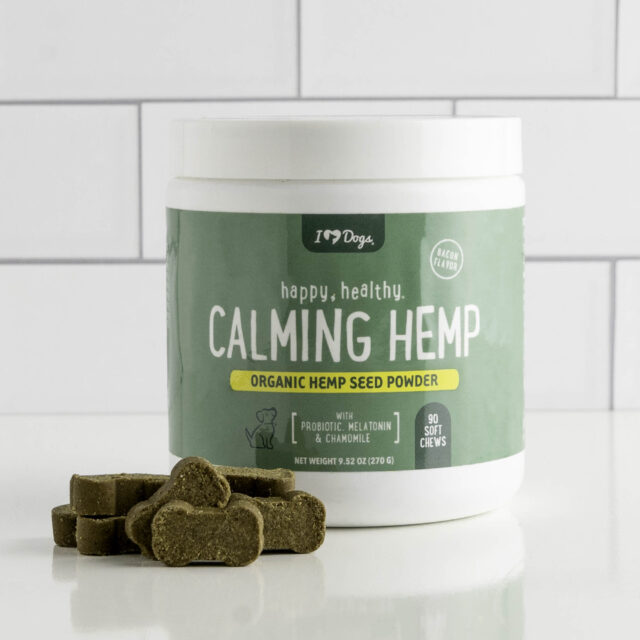Dogs can experience anxiety just like humans, whether it’s triggered by separation, loud noises, or changes in their environment. While some pups adjust quickly, others struggle with persistent stress and nervousness that can affect their well-being. Since dogs can’t tell us when they’re feeling anxious, it’s important to recognize the signs and explore safe, natural ways to help them feel more at ease.
One such solution is passion flower, an herb known for its calming effects on both humans and animals. Traditionally used to promote relaxation and reduce anxiety, passion flower works by supporting neurotransmitters that regulate stress responses. It can help dogs feel more comfortable in stressful situations without causing drowsiness, making it a great option for pet parents looking for a natural approach to anxiety relief.
If your dog struggles with anxiety, passion flower could be the key to helping them feel more relaxed, confident, and stress-free.

What is Passion Flower?
Passion flower, also known as passiflora vine, is a perennial vine distinguished by its vibrant purple flowers. There are over 500 varieties of this plant, including versions that grow into shrubs or small trees. Passion flower plants can produce fruits similar to oranges, but the gorgeous flowers they’re known for rarely bloom for longer than a day. Yet, they’re still detailed and mesmerizing even when they’re not in bloom.
These plants are native to Central and South America, where the indigenous society grew them for thousands of years. People would smoke the plants, use the plants as medicine, and eat the fruits. Today, passion flowers can be grown in warm, tropical areas all around the world, especially in Asia and New Guinea.
So, passion flowers are grown for both beauty and medicinal purposes. They’ve been used to treat anxiety, stress, and insomnia in humans for many years, and they seem to have a similar effect on pets.

Is Passion Flower Safe for Dogs?
Yes, passion flower extract is a safe ingredient. Experts have formulated passion flower supplements that are geared specifically toward canines. So, as long as your dog gets the proper dose, this plant can provide natural anxiety relief.
Passion Flower Benefits for Dogs
This plant is primarily used for its relaxing properties. It calms dogs by increasing gamma-aminobutyric acid (GABA) in the brain. Less of that naturally-occurring amino acid will decrease the activity of cells in your dog’s brain. Then, your dog’s body will feel calmer and more relaxed as a result. Passion flower may also increase serotonin and dopamine in the body to improve your pup’s mood.
Passion flower affects the nervous system with its calming and sedative properties. One of the leading causes for this plant’s success is flavonoids. The antioxidant-rich nutrients can neutralize free radicals and reduce oxidative stress. With less stress, your dog will age slower and have a lower risk of cognitive decline and other age-related conditions.
All of these aspects of passion flowers help calm your dog’s brain activity to help them relax and get a good night’s sleep. Pet parents give their dogs passion flower for all types of anxiety, such as when they leave their dog alone or before a stressful vet visit. Depending on the situation, it may be just as effective as a stress-relieving medication that the vet prescribes but with fewer side effects.
Related: The Best Calming Supplements for Dogs

What Causes Anxiety in Dogs?
Anxiety is different for every dog. The cause and its severity will vary, so pay attention to your dog’s specific behaviors to find the root of the problem. Here are some common causes of anxiety in dogs, which passion flower can help with.
Separation Anxiety
One of the most common causes of stress in dogs is separation anxiety. Now that more humans are working from home, more dogs get anxious or worried when they’re left alone. Separation anxiety may cause dogs to be destructive or have accidents when their humans are away. They may be restless, even if kept in a crate. So, taking an anxiety supplement may make alone time easier.
Fears
Specific fears may also trigger anxiety in dogs. Some pets are scared of loud sounds, while others are nervous in certain situations. Fireworks, thunderstorms, vet visits, and sudden changes are all reasons dogs can be anxious. Removing the triggers is a great way to calm your dog, but if that’s not possible, you’ll need to find ways to soothe them during stressful events.

Past Trauma
Rescue dogs may have anxiety because of abuse or trauma they endured. Their past may cause them to be hesitant around certain people, animals, or places. Dogs who had a rough past may be nervous in social settings and might prefer time alone with their loved ones. While supplements can help calm them, it’s also important for their humans to be patient and understanding.
Aging
As dogs age or develop illnesses, they may suffer from anxiety even if they never have before. Older dogs can experience problems like cognitive decline, joint pain, vision loss, or worsened hearing. Those changes could be confusing and stressful for them, leading to abnormal behaviors. Keep their environment calm and familiar as they deal with these issues.
Passion Flower for Dogs Dosage
There is no exact dosage for passion flower, so the best way to get the most accurate dosing is to talk to your vet. They can let you know if the plant will be effective for your dog’s anxiety, and then they can suggest a dosage based on your dog’s age, weight, and medical history.

You’ll rarely give your dog passion flower on its own. Instead, it’s usually used as an ingredient in an anxiety relief supplement. To determine the dosage for a specific product, check the container for details. If you’re worried about how your dog will react to it, start with a lower dose than recommended and then work your way up to the ideal dosage. Then, you can keep an eye out for any side effects and catch them early on.
Passion Flower Side Effects
Passion flower is a natural ingredient that has very few side effects. However, eating too much of any ingredient could cause problems for canines. Dogs consuming improper doses or dogs with sensitive stomachs may experience digestive issues. The plant is non-toxic, so luckily, side effects will be minor.
Pregnant dogs should avoid taking passion flower since it could stimulate the uterus. Contact your vet right away if your dog experiences any unusual behaviors when taking a passion flower supplement. They may be able to suggest a supplement that’s more suitable for your dog.
Are There Any Drug Interactions?
Avoid giving your pup passion flower if they are currently taking medication for their nervous system. Other than that, there are no known drug interactions. However, you should always tell your vet about all the medications and supplements your dog takes before adding a new supplement to their diet. That way, the vet can confirm whether or not it will be safe.

How to Serve Passion Flower to Dogs
There are lots of ways to serve passion flower to dogs. Passion flower is often included in supplements that are in the form of powder, liquid, pills, or chews. You may even be able to find fresh leaves, dried passion flower, or passion flower tea.
Most forms of passion flower supplements can be mixed with your dog’s food. However, picky pups might be quick to eat around the supplement, so you may need to disguise it in a treat if possible. Many dog parents prefer chewable supplements because they often smell like treats, so they’re more appealing to picky eaters.
Whenever you choose a new product for your dog, make sure it’s from a company you trust. When it comes to supplements, look closely at the ingredient list. If you don’t feel comfortable with the ingredients used in the product, keep looking until you find something more suitable for your furry friend.
Related: Best Dog Breath Fresheners
Anxiety-Reducing Chews
If you’re looking for an anxiety-reducing supplement for your dog, consider trying the iHeartDogs 9-in-1 Calming Chews for Dogs. These supplements come in the form of soft, bacon-flavored treats that even picky pups will enjoy. In addition to passion flower, these chews include other calming ingredients like organic hemp powder, chamomile, valerian root, melatonin, and L tryptophan.
These chews are meant to ease anxiety, promote better sleep, and improve digestion. They may also control seizures, benefit heart health, and keep your dog’s skin and coat shiny. Plus, every container purchased donates 14 healthy meals to dogs in need. So, you’ll be feeding shelter dogs while also helping your own dog’s health.
A Natural Way to Soothe Your Dog’s Anxiety
Every dog experiences stress at some point, but for some, anxiety can become overwhelming and even impact their physical health. Passion flower is a gentle yet effective way to help your pup stay calm in stressful situations, whether they struggle with separation anxiety, travel stress, or loud noises.
Before introducing any new supplement, always consult your veterinarian to ensure it’s safe and appropriate for your dog’s needs. With the right approach, you can help your furry companion feel happier, more secure, and better equipped to handle life’s challenges.
- Best Joint Supplement for Dogs
- Best CBD Gummies for Dogs
- Goat's Milk for Dogs
- Skin & Coat Supplements for Dogs
- Weight Gain Supplements for Dogs
- Muscle Building Supplements for Dogs
- Heart Supplements for Dogs
- Multivitamins for Dogs
- Pill Pockets for Dogs
- Digestive Enzymes for Dogs
- Turmeric for Dogs
- Liver Supplements for Dogs
- Tear Stain Supplement for Dogs
- Breath Fresheners for Dogs
- Kidney, Urinary, & Bladder Supplements for Dogs
- Stool Eating Deterrent for Dogs
- Eye Supplements for Dogs
- Melatonin for Dogs
- Apple Cider Vinegar for Dogs
- Green Lipped Mussels for Dogs
- L Theanine for Dogs
- Chondroitin Supplements for Dogs
- MSM for Dogs
- Valerian Root for Dogs
- Chamomile for Dogs
- Boswellia for Dogs
- L Tryptophan for Dogs
- Yucca for Dogs
- Licorice Root for Dogs
- Bromelain for Dogs
- Papain for Dogs
- Devil's Claw for Dogs
- Quercetin for Dogs
- Hemp gummy for dogs
- Best Hemp Dog Treats
- Best Hemp Oil for Dogs
- Best Calming Treats, Chews, & Supplements for Dogs
- Best Bone Broth for Dogs
- Best Fish Oil for Dogs
- Best Probiotics for Dogs
- Best Hip Dysplasia Supplements for Dogs
- Best Colostrum for Dogs
- Best Quercetin for Dogs
- Best Greens for Dogs Supplements
- Best Vitamin C Supplements for Dogs
- Best Probiotic for Dog with Allergies
- Best Taurine Supplements for Dogs
- Best Dog Food Toppers
- Best Anal Gland Supplement for Dogs
- Best Dog Probiotic Powder
- Best CoQ10 Supplement for Dogs
- Best Liquid Glucosamine for Dogs
- Best Wrinkle Creams, Balms, and Wipes for Dogs
- Best Puppy Calming Treats
- Best Colloidal Silver for Dogs
- Best Adaptogen Supplements for Dogs
- Best Cognitive Supplements for Dogs
- Best Bee Pollen for Dogs
- Best Vitamin A Supplements for Dogs
- Best Vitamin E Supplements for
- Best Liquid Glucosamine Supplements for Dogs
- Best SAM-e Supplements for Dogs
- Best Hyaluronic Acid Supplements for Dogs
- Best Apple Cider Vinegar Supplements for Dogs
- Best Diarrhea Medicine for Dogs
- Best Milk Thistle for Dogs
- Best Turkey Tail Mushroom Supplements for Dogs
- Best Astaxanthin Supplements for Dogs
- Best Lutein Supplements for Dogs
- Best Electrolyte Supplements for Dogs
- Best Coconut Oil for Dogs
- Best Prenatal Vitamins for Dogs
- Best Puppy Milk Replacements
- Best Iron Supplements for Dogs
- Best Dewormer Products for Dogs
- Best Mange Medications for Dogs
- Best Cough Relief Products for Dogs
- Best Sinus Relief Products for Dogs
- Best Collapsed Trachea Supplements for Dogs
- Best Fireworks Anxiety Relief Products for Dogs
- Best Thunderstorm Anxiety Relief Products for Dogs
- Best Travel Anxiety Relief Product for Dogs
- Best Supplements for a Dog with a Torn ACL
- Best Supplements for a Dog with Patellar Luxation
- Best Supplements for a Dog with Intervertebral Disc Disease
- Best Zinc Supplements for Dogs
- Best Biotin Supplements for Dogs
- Best Tart Cherry Supplements for Dogs
- Best Resveratrol Supplements for Dogs
- Best Ginkgo Biloba Supplements for Dogs
- Best Ashwagandha Supplements for Dogs
- Best Supplements for Dogs with Cushing's Disease
- Best Adrenal Supplements for Dogs
- Best NAD+ Supplements for Dogs
- Best NMN Supplements for Dogs
- Best Supplements for Dogs with Dementia
- Best Supplements for Dogs with CCD(Canine Cognitive Dysfunction)
- Best Fiber Supplements for Dogs
- Best Spirulina for Dogs
- Best Hairball Remedies for Dogs
- Best Eye Drops for Dogs with Allergies
- Best Magnesium Supplements for Dogs
- Best Brushes for Double-Coated Dogs
- Best Dandelion Root Supplements for Dogs
- Best Probiotic for Dogs with Yeast Infections
- Best Flaxseed Oil for Dogs
- Best Chamomile Supplements for Dogs
- Best Lavender Supplements. Treats & Sprays for Dogs
- Best Collagen Supplements for Dogs
- Best Kelp Supplements for Dogs
- Best Activated Charcoal for Dogs
- Best Slippery Elm Supplements for Dogs
- Best Supplements for Dogs with Seizures & Epilepsy
- Best Antioxidant Supplements for Dogs
- Best Ubiquinol Supplements for Dogs
- Best Hormone & Glandular Supplements for Dogs
- Best Thyroid Supplements for Dogs
- Best Iodine Supplements for Dogs
- Best Dog Shedding Supplements for Dogs
- Best Detox Supplements for Dogs
- Best Postbiotics for Dogs
- Best Aspirin Products for Dogs
- Best Dog Anti-Nausea Products
- Best Dog Mouthwashes
- Best Camelina Oils for Dogs
- Best Hemp Seed Oils for Dogs
- Best Natural Anti-Inflammatories for Dogs
- Best Cancer Supplements for Dogs
- Best Sardine & Anchovy Oils for Dogs
- Best Fatty Acid Supplements for Dogs
- Best Chia Seed Supplements & Treats for Dogs
- Best Olive Oils for Dogs
- Best Amino Acid Supplements for Dogs
- Best Moringa Supplements for Dogs
- Best Echinacea Supplements for Dogs
- Best Cranberry Supplements for Dogs
- Best D-Mannose Supplements for Dogs
- Best Nettle Leaf Supplements for Dogs
- Best Marshmallow Root Supplements for Dogs
- Best Astragalus Supplements for Dogs
- Best Pumpkin Seed Supplement for Dogs
- Best Supplements for a Dog Wetting The Bed
- Best Blueberry Supplement for Dogs
- Best Bromelain Supplements for Dogs
- Best Yucca Supplements for Dogs
- Best Ginger Supplements for Dogs
- Best Rosehip Supplements for Dogs
- Best Allergy Medicines for Dogs
- Best Reishi Mushroom Supplement for Dogs
- Best Maitake Mushroom Supplement for Dogs
- Best Chaga Mushroom Supplement for Dogs
- Best Shiitake Mushroom Supplement for Dogs
- Best Cordyceps Mushroom Supplement for Dogs
- Best Lion's Maine Supplement for Dogs
- Have question? - Ask in our Dog Health Forum

 Toledo, United States.
Toledo, United States.